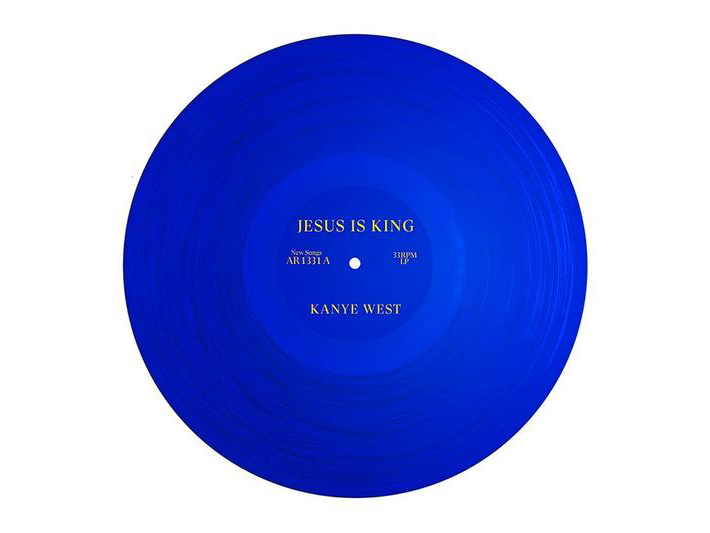Album of Kanye West’s “Jesus is King.” Photo courtesy of Def Jam/Kanye West.
The world is talking about Jesus is King.
264,000 sales in and a Billboard 200 top spot secured, Kanye West’s newest album is indisputably popular, marketable, and entirely religious.
Jesus is King has eleven faith-based songs that have garnered extensive controversy from the public eye. Some condemn its supposed Christian commodification and the presence of the religious community –– albeit an ambiguous term within itself –– is something that is taking some by surprise and others left with what they predicted. Whether it was unexpected or not, the album manifests a widely acknowledged arrival of evangelical Christianity in Kanye’s music, prompting me to wonder: 1) Just how religious is Jesus is King, and is it just a religious pedestal for Kanye to elevate his celebrity/musical status and 2) Just how important are the lyrics to a listener, and can we love music we don’t agree with?
These are two rather heavy questions. To add some context to the nature of Jesus is King, we have seen a religious connotation already established in the framework of Kanye’s public identity. His relationship with Christianity is a path that has long since been paved with ambiguities and eyebrow-raises from the public. I have always seen pop-culture (especially shown in figures like Kanye West) and gospel music as more disconnected than not, given that the majority of popular songs in charts like Spotify’s Global Top 50 aren’t usually delving deep into the extensive parameters of religion. But Kanye has sung underlying notes of Christianity, going back to his 2018 album Ye, where he prays, “Father forgive me, I’m scared of karma.” This doesn’t seem to stray too far from “Selah,” in Jesus is King, where Kanye suggests, “Ye should be made free, John 8:36.” The line is complemented by the use of church organs in the background. Lyrics like these are coupled with Kanye’s complex past with the thematic concept of Christianity as a saving grace to his mental illness, as well as his relatively new “Sunday Services” that are gospel-themed. While these patterns seem to foreshadow Kanye departing from the secular music scene, Kanye’s public identity may be more and more constructed by religious underpinnings.
These underpinnings shed light on a religious paradigm in Kanye’s music, which foils he is believed to perpetuate in his public demeanor: a massive ego. Though it was six years ago when Kanye rapped his song, “I Am a God,” the parallels still prevail today. In “Selah,” for instance, he says he was stabbed in the back by Judas, thus comparing himself to Jesus. Is Kanye preaching about God, or is he preaching about himself as God? While he could be finding a safe haven, a space for healing, and room for redemption in the Christian faith, he might just as well be using it as a facade for executing how highly he thinks of himself, perhaps up to the level of a god complex. However, all things considered, it’s important to remember how religion –– as well as Christianity –– is an exceptionally broad term, wherein every follower has a different interpretation as to how to manifest their beliefs. So, while Kanye could be commodifying a religion to serve himself, he could also be renouncing his sins on a platform used for good.
This still leaves the question of how 260,000 copies of Jesus is King could be sold to so many people who, statistically speaking, aren’t religious. The lyrics sing Psalms and scriptures, Bible excerpts and allusions. Do we have to have a spiritual connection with the subjects of the songs we listen to when ideologies are deeply embedded in the lyrics? The powerful message of Jesus is King may not necessarily fade into oblivion, but rather pale in comparison to the tunes of the songs themselves. While it may be deeply personal to the artist, this intimacy may not translate to the listener.
I listened to some of the album’s songs myself, and though I don’t entirely have a religious affinity towards the lyrics, the background gospel music is undoubtedly a powerful aspect of a song like “Selah.” I would also presume that much of the success of Jesus is King can be attributed to Kanye’s well-established celebrity status and how prevalent his platform is in pop-culture, meaning that any album release of his, really, would garner worldwide attention — even if only ephemerally.
Whether or not we can truly listen to a song without having an emotional tie to its lyrics is a debatable concept. With that said, to listen is to explore, react, and grapple with the ideas that the music presents, which could imply so much more than just lyrics. The aforementioned gospel choir could invoke a poignant reaction in a listener like me, not so much because I find the message powerful, but because the melody is what delivers the power. Jesus is King gives me mixed emotions, and Kanye West’s motives are still up for debate, but in some ways when I listened to the album, the music detached itself from evangelical Christianity at moments offering tunes that I can confidently say I enjoyed. •










